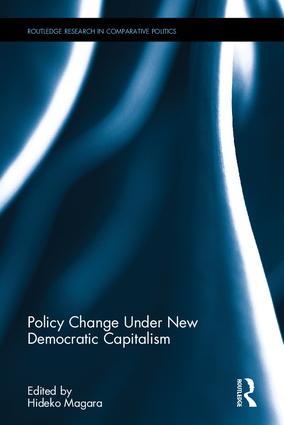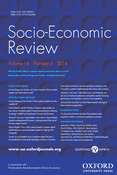In Policy Change Under New Democratic Capitalism, Edited by Hideko Magara, Chapitre 10, Routledge, Abingdon et New York, 2017, p. 202-222.
About the Book
Democratic capitalism in developed countries has been facing an unprecedented crisis since 2008. Its political manageability is declining sharply. Both democracy and capitalism now involve crucial risks that are significantly more serious than those observed in earlier periods. The notion of policy regimes has gained new significance in analysing the possibilities for a post-neoliberal alternative. Policy innovations directed towards an economic breakthrough require both political leadership and a new economic theory. The processes of political decision making have become quite distant from the public realm, and a limited number of economic and political elites exert influence on public policy.
This book examines, from a policy regime perspective, how developed countries attempt to achieve such a breakthrough at critical junctures triggered by economic crises. It initially assesses the nature of the present crisis and identifies the actors involved. Thereafter, it provides an analytical definition of a crisis, stressing that most crises contain within them the potential to be turned into an opportunity. Finally, it presents a new analytical design in which we can incorporate today’s more globalized and fluid context.
Table of Contents
I.Introduction
1.New Models of Democratic Capitalism and Policy Regime Change (Hideko Magara)
II.Models of New Democratic Capitalism
2.Crisis, Oportunity and Democracy in Contemporary Europe (Philippe Schmitter)
3.The Rise of the European Consolidation State (Wolfgang Streeck)
4.Cost of Democracy: Changing Aspects of Modern Democracy (Hiroshi Shiratori)
5.Institutional Change and Regime Crisis: A Critical Viewpoint on Neoliberalism (Toshio Yamada)
III.Comparative analyses
6.The Political-Economic Implications of De-industrialization with Varieties of Capitalism: An EU-Japan Comparative Analysis (Hiroyasu Uemura and Shinji Tahara)
7.Growth, Employment and Social Security Governance in the EU and Japan (Koji Fukuda)
8.The Diversity of the ‘Neoliberal Policy Regime’ and Income Distribution (Yuji Harada)
IV.Regime Competition in International Rivalry and Cooperation
9.Using Neofunctionalism to Understand the Disintegration of Europe (Philippe Schmitter and Zoe Lefkofridi)
10.From the Variety of Socioeconomic Regimes to Contemporary International Relations (Robert Boyer)
11.Balance-of-Payments Constraints, Change in Income Distribution, and Economic Growth in the Era of Globalization (Hiroshi Nishi)
About the Series
Routledge Research in Comparative Politics
Subject Categories
BISAC Subject Codes/Headings:
- POL024000
- POLITICAL SCIENCE / Public Policy / Economic Policy
- POL033000
- POLITICAL SCIENCE / Globalization
Socio-Economic Review, Discussion Forum: “Brexit: understanding the socio-economic origins and consequences” , 2016, Vol. 14, n° 4, p. 836-845.
Abstract
Jacqueline O’Reilly, Julie Froud, Sukhdev Johal, Karel Williams, Chris Warhurst, Glenn Morgan, Christopher Grey, Geoffrey Wood, Mike Wright, Robert Boyer, Sabine Frerichs, Suvi Sankari, Akos Rona-Tas and Patrick Le Galès
The unprecedented geopolitical shift resulting from Brexit reflects deep socio-economic fault lines within and beyond the UK. In many ways foreshadowing the US presidential election of Donald Trump, Brexit brought to the surface and gave a public voice to socio-economic divisions that were deeply embedded, sometimes illogical, but until now had either been ignored or hushed out of ‘respectable’ public debate. This Discussion Forum emanates from a spontaneous seminar organized 2 days after the Brexit vote on June 25, 2016 as part of the SASE conference held in University of California–Berkeley and followed by an open call for papers by Socio-Economic Review. The papers here draw attention to the origins of the Brexit vote in deep-seated socio-economic divisions (O’Reilly), widening differences in economic performance across sectors and regions of the UK (Froud, Sukhdev and Williams) and the growth of poor quality jobs (Warhurst). Meanwhile, the political dynamics of the Brexit vote were also shaped by the fractured nature of UK business elites (Morgan), divisions between locals and cosmopolitans (Grey) and creative but muddled actions of elites that arguably generated consequences they themselves failed to fully anticipate (Wood and Wright). From the perspective of Europe, Brexit reflects a history of dysfunctional economic policy in Europe that prioritized market competition in ways that neglected and ultimately undermined solidarity (Boyer). Here, Brexit reflects a political strategy to both renationalize and recommodify solidarity in the face of fears over migration, and which are likely to have major consequences for social solidarity in Europe more generally (Frerichs and Sankari). However, Brexit is unlikely to provide a durable social and political solution to the wider tensions between globalization and democracy, which also affect all countries throughout Europe (Rona-Tas). Ultimately, the Brexit vote underlines social divisions that combine class inequalities with regional ones, not just in Britain but throughout Europe (Le Galès).
Paper prepared for the « Forum de la régulation« ,
La théorie de la régulation à l’épreuve des crises, Paris 10-12 juin 2015
Interview made com Robert Boyer, CNRS, pelos Lena Lavinas professores do, da UFRJ, e Miguel Bruno da UERJ, no. seminario “O Desenvolvimento No. Século XXI”., Octobre 2016
Présentation Powerpoint lors d’un séminaire à la Maison Franco-Japonaise, Tokyo (Japon), 19 septembre 2016
In : Neostructuralism and heterodox thinking in Latin America and the Caribbean in the early twenty-first century, eds, Alicia Bárcena Antonio Prado, Economic Commission for Latin America and the Caribbean (ECLAC) Santiago, May 2016, Chap. , p. 273-297.
Presentation at the Seminario sobre Neoestructuralismo y Economia Heterodoxa, CEPAL, Octobre 2013




